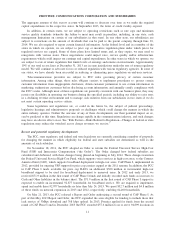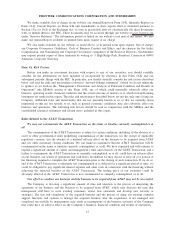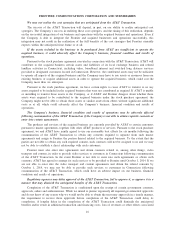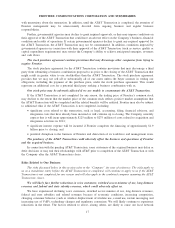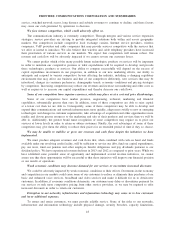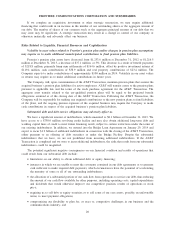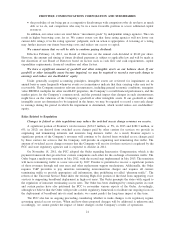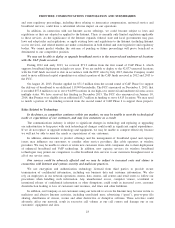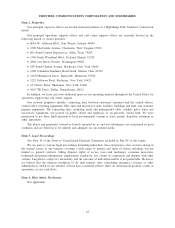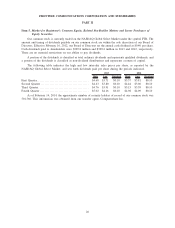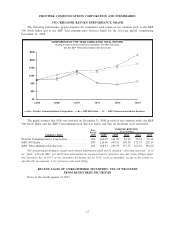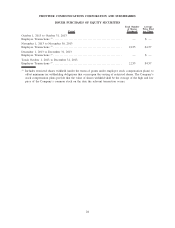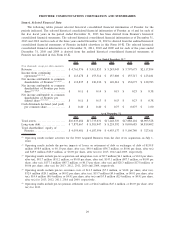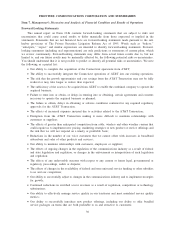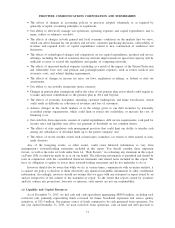Frontier Communications 2013 Annual Report Download - page 22
Download and view the complete annual report
Please find page 22 of the 2013 Frontier Communications annual report below. You can navigate through the pages in the report by either clicking on the pages listed below, or by using the keyword search tool below to find specific information within the annual report.•the possibility of our being put at a competitive disadvantage with competitors who do not have as much
debt as we do, and competitors who may be in a more favorable position to access additional capital
resources.
In addition, our senior notes are rated below “investment grade” by independent ratings agencies. This can
result in higher borrowing costs for us. We cannot assure you that these rating agencies will not lower our
current debt ratings, if in the rating agencies’ judgment, such an action is appropriate. A lowering of a rating
may further increase our future borrowing costs and reduce our access to capital.
We cannot assure that we will be able to continue paying dividends.
Effective February 16, 2012, our Board of Directors set the annual cash dividend at $0.40 per share.
However, the amount and timing of future dividend payments is subject to applicable law and will be made at
the discretion of our Board of Directors based on factors such as cash flow and cash requirements, capital
expenditure requirements, financial condition and other factors.
We have a significant amount of goodwill and other intangible assets on our balance sheet. If our
goodwill or other intangible assets become impaired, we may be required to record a non-cash charge to
earnings and reduce our stockholders’ equity.
Under generally accepted accounting principles, intangible assets are reviewed for impairment on an
annual basis or more frequently whenever events or circumstances indicate that their carrying value may not be
recoverable. The Company monitors relevant circumstances, including general economic conditions, enterprise
value EBITDA multiples for other rural ILEC properties, the Company’s overall financial performance, and the
market prices for the Company’s common stock, and the potential impact that changes in such circumstances
might have on the valuation of the Company’s goodwill or other intangible assets. If our goodwill or other
intangible assets are determined to be impaired in the future, we may be required to record a non-cash charge
to earnings during the period in which the impairment is determined, which would reduce our stockholders’
equity.
Risks Related to Regulation
Changes in federal or state regulations may reduce the switched access charge revenues we receive.
A significant portion of Frontier’s total revenues ($234.5 million, or 5%, in 2013 and $282.3 million, or
6%, in 2012) are derived from switched access charges paid by other carriers for services we provide in
originating and terminating intrastate and interstate long distance traffic. As a result, Frontier expects a
significant portion of the Company’s revenues will continue to be derived from switched access charges paid
by these carriers for services that the Company will provide in originating and terminating this traffic. The
amount of switched access charge revenues that the Company will receive for these services is regulated by the
FCC and state regulatory agencies and is expected to decline in 2014.
On November 18, 2011, the FCC adopted the Order regarding Intercarrier Compensation, which is the
payment framework that governs how carriers compensate each other for the exchange of interstate traffic. The
Order began a multi-year transition in July 2012, with the second step implemented in July 2013. The transition
will move terminating traffic to a near zero rate by 2017. Frontier is permitted to recover a significant portion
of those revenues through end user rates and other replacement support mechanisms. Additionally, the Order
requires VoIP providers to pay interstate terminating interconnection charges and requires all carriers
terminating traffic to provide appropriate call information, thus prohibiting so-called “phantom traffic”. The
reform of the Universal Service Fund shifts the existing High-Cost portion of the fund from supporting voice
services to supporting broadband deployment in high-cost areas. The Order preempts the states with regard to
the regulation of intrastate terminating access rates. The Order has been challenged by certain parties in court
and certain parties have also petitioned the FCC to reconsider various aspects of the Order. Accordingly,
although we believe that the Order will provide a stable regulatory framework to facilitate our ongoing focus on
the deployment of broadband into its rural markets, we cannot predict the long-term impact at this time.
The FCC also has an ongoing proceeding considering whether to make changes to its regulatory regime
governing special access services. When and how these proposed changes will be addressed is unknown and,
accordingly, we cannot predict the impact of future changes on the Company’s results of operations.
21
FRONTIER COMMUNICATIONS CORPORATION AND SUBSIDIARIES


